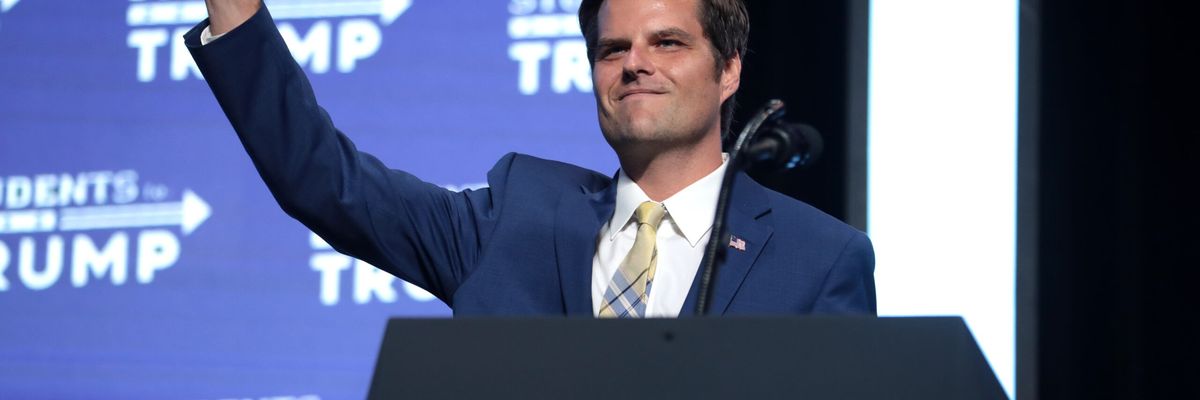UPDATE: 9/28 11 p.m. EST: A similar amendment to the Department of State, Foreign Operations, and Related Programs Appropriations Act, offered by Reps. Thomas Massie (R-Ky.) and Jim McGovern (R-Mass.) was defeated on the floor on Thursday night. The amendment received more votes than original effort, with 178 members voting in favor. Ninety Republicans and 88 Democrats supported Thursday's measure.
"Cluster bombs undermine our effort to promote human rights and dignity everywhere. ... Unexploded cluster munitions have maimed or killed countless civilians over the last few decades, including an outrageous number of children," said Rep. Barbara Lee (D-Calif.) during the floor debate. "We are still spending millions of dollars to clean up cluster munitions used in Southeast Asia decades ago. We cannot be complicit in their further spread."
"We shouldn’t be providing [cluster munitions] to any other country," added Rep. Massie. "And certainly not under the guise of ‘world peace,’ because they last for years and years in many cases."
A bipartisan amendment to the Department of Defense Appropriations Act which would have banned the transfer of cluster munitions introduced was defeated on the floor on Wednesday. The amendment, introduced by Rep. Matt Gaetz (R-Fla.), was rejected by a vote of 160 - 269. It was the latest in a series of Congressional efforts to reverse the Biden administration’s July decision to provide Kyiv with the controversial weapon.
“These cluster bombs are indiscriminate," Gaetz said on the House floor Wednesday. "They've killed tens of thousands of people... and when this is all done, we'll be right back here on the floor appropriating money to de-mine the cluster bombs that we're now sending, which seems ludicrous to me."
The effort on Wednesday was a bipartisan one, with 75 Democrats and 85 Republicans voting in favor of the measure. Twenty-six more Democratic members supported this amendment than did one introduced over the summer, which would have specifically barred the transfer of cluster bombs to Ukraine.
"Many of us have this idea of American exceptionalism, that America is set apart from the rest of the world. Well, that's certainly true when it comes to cluster munitions —and not in the way that we want. America is an outlier,” said Rep. Sara Jacobs (D-Calif.), the lead Democratic co-sponsor, during a debate over the amendment earlier on Wednesday. The United States is not among the 112 state parties that signed the 2008 Convention on Cluster Munitions.
“These weapons maim and kill indiscriminately. (...) These bomblets are small, colorful, and interesting shapes, so to children they look like toys. So when kids find these unexploded bomblets found in trees, or in the water, or simply on the ground, and try to pick them up and play with them, they can lose a limb or their life in the blink of an eye,” added Jacobs. ““The human cost is far too high to justify.”
Since World War II, cluster munitions have killed an estimated 56,500 to 86,500 civilians and they often detonate months or years after the conclusion of a conflict .
The House first attempted a similar maneuver in July, when Jacobs and Rep. Ilhan Omar (R-Minn.) introduced an amendment to the National Defense Authorization Act (NDAA) that would have prevented the export of cluster munitions.
The effort created some bipartisan momentum, but was eventually derailed after the House Rules Committee elected to block the bipartisan proposal in favor of a new amendment sponsored by Rep. Marjorie Taylor Greene (R-Ga.) that would only stop transfers to Ukraine. The last minute switch prompted speculation that supporters of transferring the munitions had put a “poison pill” into the amendment by making the controversial Greene the lead sponsor.
Opposition to cluster munitions is one of the only places that the Biden administration has faced any pushback from its party over Ukraine policy.
“The decision by the Biden administration to transfer cluster munitions to Ukraine was unnecessary and a sad mistake,” said Rep. Betty McCollum (D-Minn.) during the debate on the floor. “Cluster ammunition into the battlefield in Ukraine undermines our moral authority. The legacy of cluster munitions is misery, death, and expensive clean up after generations of use.”
















